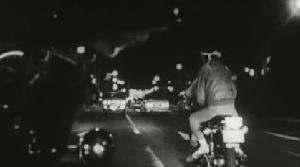
Godspeed You! Black Emperor (Mitsuo Yanagimachi, 1976)
Japanese Title: Goddo supiido yuu! Burakku emparaa
Japanese cinema of 60's and the 70's can be characterized by the abundance of local films being released that tackled the youth of that era. Nagisa Oshima, Seijun Suzuki, and other filmmakers started seeing the huge gap that was being created by a Japanese society that was fastly modernizing. It seems that the adults who have experienced the tragedies and the hardships of post-war Japan couldn't understand the newly found freedom and wealth that kept the newer generation of Japanese distant from their parents. As the distance is obvious, it an inevitable response that the youth would separate themselves from their parents and band together. Mitsuo Yanagimachi's Godspeed You! Black Emperor is a documentary that followed a biker group and sought to paint a clear and real picture as to who these alienated youth are and why and how they are doing it.
It starts out well and seemed to have a form. The biker group of interest here call themselves Black Emperors and they enjoy riding around Shinjuku with their loud bikes, carrying weapons and seeking fights with other gangs or if not, the city's police. Yanagimachi shows a member being accepted into the gang, with each of the existing members introducing themselves, proudly declaring that they are beggars, school drop-outs, or jobless loafers. It's not a pretty picture --- Japanese kids airspraying city walls with the swastika probably unaware what the symbol means, they shave their eyebrows, trouble their parents with charges of misdemeanors. Then, Yanagimachi shows an intimate picture of one of the members, Decko, who lives with his parents and one night, urges his mom to accompany him to the court the following day. The mother does not attend, and we witness Decko going out of the court, his driving license suspended, and comforted by his fellow gang member.
Then the film just stops and drags itself into a meaningless void. Yanagimachi details how the gang works. He shows footages of gangmembers selling dolls and tickets to people, and how the "elders" punish those who lie and pilfer gang funds. We are then entreated to a rather uninteresting and lengthy conversation between two of the younger gangmembers who wanted to quit Black Emperors. The conversations between themselves and then, with the gang's "elders" is not really something I'd like to spend my afternoon watching. It could've been trimmed down as most of the footage is negligible and quite irrelevant to the entire picture.
But the power of Yanagimachi's film isn't with the subject. Today, the Black Emperors seems mundane and not really special, given the fact that being caught for speed driving isn't really not much of a concern these days when kids would rather shoot classmates with a rifle to get attention. Yanagimachi shows great talent with how intimate he has come in showing his subjects. His subjects doesn't seem to mind that a camera is rolling and recording their meetings and their conversations. It's either everything is rehearsed or Yanagimachi has truly earned these gangmembers' trust and confidence that they let him into the gang. A recurring imagery used by Yanagimachi is of the teenagers fastly driving the city streets at night. It's a moving image, which has been often used in cinema to symbolize freedom and living life in the fast lane. Here, despite the fact that the recurring moving image of bikes crowding the streets would always put me in awe, I found it lacking given the fact that the entire film seems to fall short of what it tried to do.
No comments:
Post a Comment